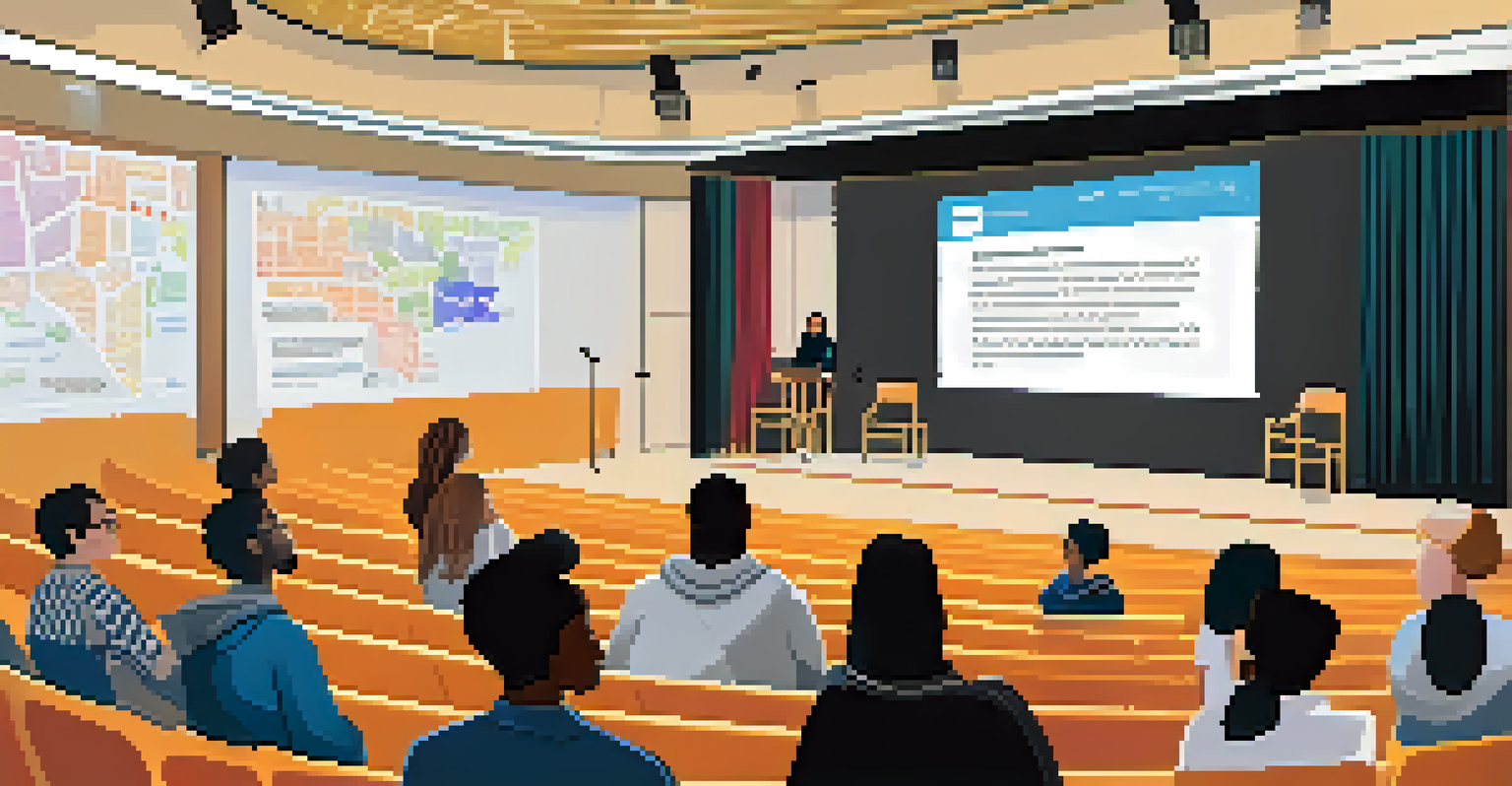Transformative Education: Innovating for Social Change

Understanding Transformative Education and Its Impact
Transformative education goes beyond traditional learning; it aims to redefine how we engage with knowledge. At its core, this approach encourages critical thinking and a deeper understanding of social issues. By fostering an environment where students question norms and explore real-world problems, transformative education becomes a catalyst for change.
Education is the most powerful weapon which you can use to change the world.
For instance, consider a classroom where students discuss climate change not just as a scientific fact but as a societal challenge demanding action. This method not only empowers students but also equips them with the tools needed to address pressing issues in their communities. Ultimately, this kind of education lays the groundwork for future leaders committed to social equity.
As educators embrace this transformative approach, they create spaces that encourage collaboration, empathy, and innovation. This shift in perspective not only benefits individual learners but also cultivates a culture of social responsibility. Transformative education, therefore, is not just about personal growth; it’s about fostering a collective movement towards positive societal change.
Key Principles of Transformative Education
The foundation of transformative education rests on a few key principles, including critical reflection, dialogue, and experiential learning. Critical reflection prompts students to analyze their beliefs and assumptions, fostering a deeper understanding of themselves and the world around them. This self-awareness is crucial for initiating change, both personally and socially.

Dialogue plays a vital role in this educational model, allowing students to engage with diverse perspectives. When learners actively participate in discussions, they develop empathy and appreciation for differing viewpoints, which is essential for addressing complex societal issues. This collaborative learning experience prepares students to work with others towards common goals.
Lastly, experiential learning emphasizes the importance of applying knowledge in real-world settings. Whether through community service projects or internships, students gain firsthand experience in tackling social challenges. This principle reinforces the idea that education should not exist in a vacuum but should be intertwined with the world, making learning more relevant and impactful.
Innovative Approaches in Transformative Education
Innovative approaches, such as project-based learning and technology integration, are reshaping transformative education. Project-based learning encourages students to work on real-life projects that address local or global issues, allowing them to apply their skills in meaningful ways. This hands-on approach nurtures creativity and critical thinking, essential for driving social change.
The best way to predict the future is to create it.
Moreover, technology plays a pivotal role in expanding access to transformative education. Online platforms enable students from diverse backgrounds to collaborate and share resources, breaking down geographical barriers. This digital landscape fosters a global perspective, where learners can engage with social challenges worldwide and develop solutions together.
Incorporating arts and culture into the curriculum is another innovative strategy that enriches transformative education. By connecting academic content with creative expression, students are encouraged to explore their identities and the issues that matter to them. This holistic approach not only enhances engagement but also empowers students to become advocates for change through their unique voices.
The Role of Educators in Transformative Learning
Educators play a crucial role in facilitating transformative learning experiences. They act as guides, encouraging students to explore, question, and reflect on their learning journeys. By creating a supportive environment, teachers can foster a sense of belonging that empowers students to take risks and engage deeply with the material.
Moreover, educators must continuously evolve their teaching practices to incorporate new methodologies and technologies. This adaptability not only keeps the curriculum relevant but also models lifelong learning for students. When educators embrace innovation, they inspire their students to do the same, cultivating a culture of curiosity and exploration.
Lastly, the most effective educators prioritize building relationships with their students. By understanding their unique backgrounds and perspectives, teachers can tailor their approaches to meet individual needs. This personalized attention is key to unlocking each student’s potential and driving transformative change in the classroom and beyond.
Community Engagement and Its Importance
Community engagement is a cornerstone of transformative education, bridging the gap between theory and practice. By involving local communities in the learning process, students gain valuable insights into real-world challenges. This interaction not only enhances their learning experience but also fosters a sense of responsibility towards their communities.
For example, students might collaborate with local organizations on sustainability projects, applying their knowledge while making a tangible impact. Such partnerships not only benefit students but also empower communities to address pressing issues collaboratively. This reciprocal relationship enriches both the educational experience and the community’s capacity for change.
Furthermore, community engagement promotes social cohesion and a sense of belonging among students. As they work alongside diverse groups, they learn to appreciate different cultures and perspectives. This exposure is vital for developing empathetic leaders who are equipped to navigate and address the complexities of modern society.
Measuring Success in Transformative Education
Measuring success in transformative education can be challenging, as traditional metrics often fall short. Instead of solely focusing on grades and test scores, educators should consider holistic assessments that capture a student's growth in critical thinking, collaboration, and social awareness. This broader perspective allows for a more comprehensive understanding of a student’s development.
Qualitative assessments, such as reflective journals or portfolio projects, provide valuable insights into student learning journeys. These tools encourage students to articulate their thoughts and experiences, fostering deeper self-reflection. By placing value on personal growth alongside academic achievements, educators can better gauge the impact of transformative education.
Additionally, gathering feedback from students and community partners can help educators refine their approaches. By actively seeking input from those involved, they can identify strengths and areas for improvement. This commitment to continuous improvement ensures that transformative education remains responsive to the needs of students and their communities.
The Future of Transformative Education and Social Change
Looking ahead, the future of transformative education holds exciting possibilities for social change. As educational institutions increasingly prioritize innovation and inclusivity, we can expect to see a rise in programs that address pressing global issues. This shift will not only empower students but also create a more equitable and sustainable world.
Emerging trends, such as interdisciplinary learning and global citizenship education, are paving the way for a more interconnected approach to learning. By encouraging students to explore the intersections of various fields, educators can prepare them to tackle complex challenges collaboratively. This holistic perspective is essential for fostering a new generation of problem solvers.

Ultimately, the success of transformative education hinges on our collective commitment to creating a better future. As educators, students, and community members come together, we can drive meaningful change that transcends the classroom and resonates throughout society. By embracing this vision, we can ensure that education remains a powerful tool for social transformation.